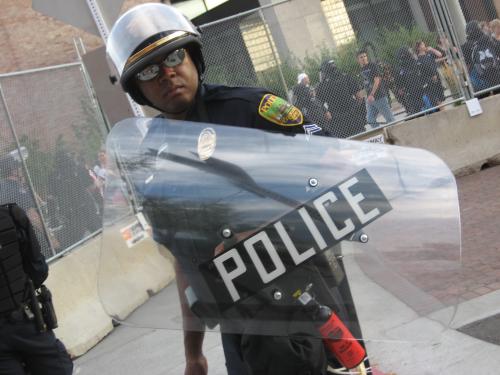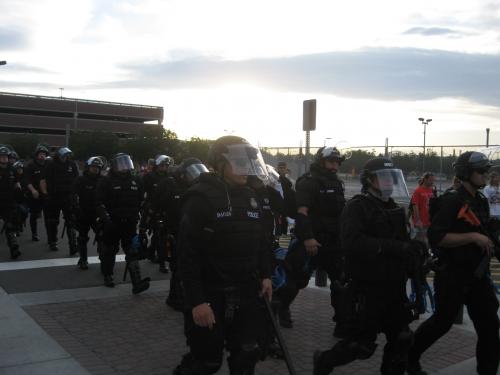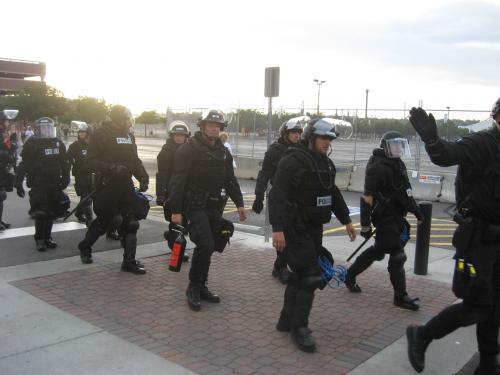John Kerry touched my shoulder earlier tonight in Denver.
It was in the basement of the strange-looking, modern-pyramidesque Renaissance Hotel, where the Maryland delegation is staying, which isn't too convenient for them because it's on the other side of the city from all of the action. Congressman Elijah Cummings hosted a reception there tonight, while the Massachusetts folks were partying upstairs.
Shortly after entering the large ballroom, I felt a hand on my shoulder. I turned around, thinking it was someone I knew, only to see the distinctive looking former presidential candidate right behind me. It looked like he was trying to shake as many hands as possible, while leaving the room at the same time... very presidential.
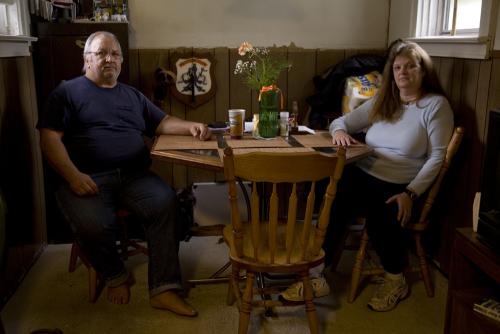
We spent our first full day in West Virginia visiting people in their homes, taping interviews. People shared incredible stories with us that we'll be bringing back. I recorded about 6 hours of audio today alone. We saw a 90 year-old woman's fingers turn black with coal dust from running them across her tv screen. Again and again, people expressed their respect for the old ways of underground mining. At the same time, they spoke with outrage about mountaintop removal and the unprecedented level of destruction coal companies have caused in this area over the past 25 years or so.
Antrim took this picture of Patty Sebok and her husband Harry "Butch" Sebok in their kitchen. Patty is a community activist who works for Coal River Mountain Watch. Butch is a union miner who worked underground for almost 30 years. He was forced to retire when a doctor told him he risked paralysis if he continued working after an injury on the job that resulted in a herniated disk.
We'll be up bright and early in the morning to tape some more interviews before heading up Kayford Mountain to see an active mountaintop removal site and meet the last man holding onto his home as the mountain is destroyed all around it. I encourage everyone to do their own research to learn more about mountaintop removal and the history of coal mining in West Virginia and beyond. Please let us know if you have any questions or thoughts to share.
-Justin
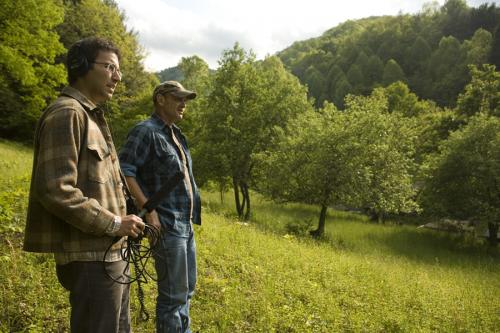
When we flip on a power switch in our homes, where does the electricity come from? How is it generated? There's a good chance it's from a coal-fired power plant. Click here for an easy way to trace your power source with nothing more than your zip code. With all the talk of developing new, sustainable energy sources, we're still relying heavily on the old standbys like oil and coal.
Last November on The Marc Steiner Show, we had a coal industry spokesperson and a group of West Virginia residents as guests on the show to discuss coal mining. The conversation centered around mountaintop removal, one of the most widespread and quickly growing methods of mining coal in use today.
We were all blown away by what we learned in the process of putting that show together, and since then we've been wondering why this issue hasn't been getting the attention it deserves. So, we decided that it's something we should keep an ongoing focus on. Look for us to have continuing coverage both on this website and on the air.
Rather than covering the issue from afar, we decided to go straight to the source. This morning, I set out for the coal fields of southern West Virginia, along with photojournalist Antrim Caskey, who's been working for the past 3 years to get people to pay attention to and do something about the environmental, including human, destruction caused by modern day coal mining practices in Appalachia. We'll be spending this week down here lining up as many people as possible to contribute first-hand coverage to CEM on an ongoing basis. We'll also be coming back with tons of new audio, photos, and video.
We're spending the night in the Coal River Valley with Debbie Jarrel and Ed Wiley. You'll hear a lot more about and from them if you stay with us here, for now check out one of the major projects they've been involved with, advocating for the safety and health of the students, teachers, and staff of Marsh Fork Elementary School. This site is full of info on that; briefly, it's a school down the road from them sitting right down the hill from a huge, leaky sludge impoundment, or what Ed describes as a 2.8 billion gallon toxic waste dump.
The picture at the top is from this afternoon, during a beautiful hike Ed took us on in the woods behind his home. The pictures below are from this evening. They're taken from the road, as we drove past an area being cleared by a coal company to put in a new beltline to transfer coal from the mining site to the processing plant.
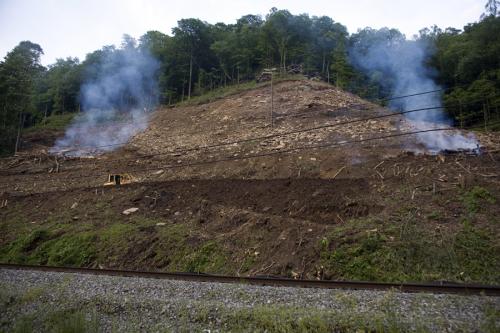
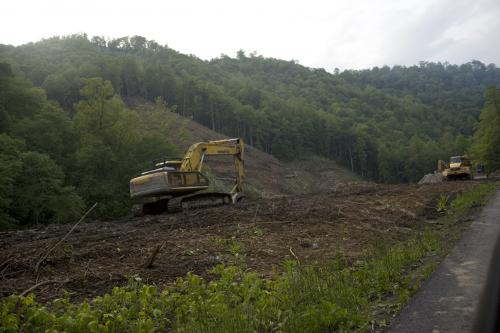
In preparation for Wednesday night’s Community Advisory Board meeting, it is time for a little history to set the record straight.
Tony Brandon and Barbara Bozzuto had already been trying to remove me as a force at our station prior to its official founding in February 2002.
In March of 2001, I along with Martha Rudzki, and our attorney, Scott Johnson, formed a non-profit to buy WJHU from Johns Hopkins University.
We urged listeners to contribute to the effort. We raised $750,000. This has become a bone of contention. Tony Brandon claims we raised less than $250,000. While the money itself is unimportant, in light of the effort I led to unite a community to build a new station, its disagreement is emblematic of the problem.
But here’s the reality:
- One person who later became a guarantor pledged $100,000 the day we started our campaign to buy the station.
- In late summer another family introduced to me by Marilyn Powel gave $250,000. They request anonymity.
- Around that time Albert Williams, who became a guarantor, was introduced to me by Marilyn Powel. He gave $50,000.
- Six people (it may be more, I have to check the records) gave $10,000
- Four people contributed $25,000.
- The rest came in contributions from $10 to $5000.
- We have all the records.
Now we come to the station purchase.
Jonathan Melnick, who became a guarantor, said to me that we can never raise all this money. We needed a bank and guarantors for a loan. He offered to become a guarantor.
It was then that I met Tony Brandon, through a mutual friend. He offered his help. Tony and his brother own American General Media, the largest family-owned radio business in America.
Tony brought in Mercantile Bank. They had been involved as the bank of record for many of his business dealings.
He then brought in Charlie Salisbury, one of his business partners, to be a guarantor. So, we had four people (two of his and two I brought in) and the cash I had raised.
Marilyn Powel introduced us to and brought in as guarantors the Daniels family and Albert Williams.
Charlie Salisbury brought in the Linehans and the Bozzutos.
We had our guarantors. It as at that point Tony Brandon came to me to say that Mercantile would not guarantee the loan as long as I was President of the corporation. He had to be President. I went along. I did not want to manage the station; I wanted to build our broadcasting world.
It was then that it all began to unravel. I saw the danger signs.
Tony Brandon said that if he could not run the station by himself he would leave.
Board Chair Charlie Salisbury in our first board meeting looked at me and said,
“Thank you Marc, but we are the guarantors of the bank’s money and we will take it from here.”
I responded that I was the guarantor of the listeners’ money ($750,000 in contributions) and I wasn’t going anywhere.
From the beginning they tried to marginalize my influence and position at the station. I refused to budge. I demanded to be Exec. Vice President for Broadcasting, a member of the board, and a partner in running the station.
They feared their effort would dissolve. So, Barbara Bozzutto brought in Ray Blank. Ray is a noted business consultant. He has saved and helped build many companies. He is a business therapist.
In the press recently, Barbara Bozzutto said that they brought in a coach for me but it did no good. Well, that was a lie. They are talking about Ray Blank. While he has become a mentor for me in recent years, he was brought to WYPR to help Tony and I manage the company together. Tony wanted to do it alone, I insisted on being part of a team. From 2001 through the end of 2004 Ray met with me and Tony every Friday morning so we could come to management decisions.
The gulf between us was wide.
The make up of the board became a divide. I proposed that some of the $25,000, $10,000, $5,000, $1000, and donors of lesser amounts be made members of the board. I also suggested that members elect people from that community to be represented on the board. That was not accepted. The board became made up primarily of the wealthiest members of part of the community. There are many good people on that board; however, a public radio board needs a balance. We need all sectors of our community represented. It would create a dynamic synergy. Either they thought it would give too much power to me or their conception of a board is people like themselves.
Tony Brandon and Charlie Salisbury insisted that I fire Sunni Khalid as News Director. First, Tony and some board members fought my effort to raise money to start a news department. By that time we had divided up responsibilities. It was my bailiwick so they had no choice, as I had little choice when I disagreed with his management decisions.
I raised over $300,000 to launch the News Department, mostly from the Open Society Institute but also from Town Creek and Goldsecker. The first person I called was Sunni Khalid to be News Director. Then I called Fraser Smith to convince him to come over to us.
They wanted to fire Sunni because he and seven other African-American employees were suing NPR for racial discrimination. He had been black-balled by the industry. I hired him because of his reputation for ethical journalism and because he would build a multi-cultural team that reflected our community.
They asked if my loyalty was to the Chairman of the Board or to Sunni. I told them it was to Sunni and justice. They had to fire me first. Sunni stayed. You see the result. WYPR has one of the best local news departments in the country.
Tony even tried to get me to fire Andy Bienstock. I stood up for him. Things do get convoluted.
Ray Blank witnessed all this and more.
OK, I could go on ad nauseum but let me stop and jump to the nitty gritty of 2004.
2004
We are now three years into the new station and my weekly marathon management session with Tony Brandon and Ray Blank.
Baltimore Magazine’s Best in Baltimore issue came out. In it was a small piece that said “Most Unlikely Media Mogul …. Marc Steiner.” I thought it was hilarious, as did Valerie.
But the next day I go in to see Tony, who slides the piece across the table at me. I quipped how funny it was. He said ‘It was not funny but an outrage.’ He accused me of planting it in Baltimore Magazine. He said it would chase off our biggest corporate and banking underwriters. He wanted me to write a letter to the magazine disavowing the mantle. He said that he and the guarantors deserved recognition, but the only one who gets is me.
Then Barbara Bozzutto said that the station needed a second voice. Someone like Armstrong Williams, the Black conservative talk show host.
She wrote a version of the history of the station that started to write me out of our history. She insisted that there could only be that public line about the station. I refused to sign on to that fabrication.
So, they wanted a “Second Voice.” I began a three month research project that interviewed twenty sister NPR stations who had local programming, and studied the results of our focus group. I came back with a long report suggesting we need an Arts and Culture program. I had production plans in the report. It became Maryland Morning.
I gave Tony the report, but it never got to the board. I was told I could not oversee the development of the new show, because it would be in competition with me. Andy Bienstock would over see it. The unraveling came faster now.
- Tony began lobbying the board that I was a loose cannon, bad manager and a cowboy.
- I put a grant in for our Vietnam Documentary.
- In spite of signing off on it, Tony tells the board it was my cowboy actions. This grant, he says then, has nothing to do with the agenda of the station.
2005
Just two weeks before my departure to Vietnam, Tony sends me an e-mail saying he is vacating the position of Vice President and I have a week to respond.
I reject that, force him to back off, and go to Vietnam.
He says I must have a response by July 15th.
When we get back from Vietnam, an intense battle erupts all summer long over the issue.
The board is convinced that I need to step down so I can pursue my work.
Myth becomes fact. People are convinced this is being done in my and the station’s best interests.
I could either have made this a public fight, which could have destroyed the station, or have negotiated a contract to my liking, so I could focus on my radio and community work.
I chose the latter.
But it did not end there.
- Tony Brandon and Barbara Bozzutto could not stand it that I was the voice and the face of the station.
- Tony kept on about how my shows insulted certain underwriters.
- Andy Bienstock became head of programming and the Vice President.
- My 7 PM repeat was taken off the air.
- My show became promoted less and less on our airwaves.
- There was constant pressure about my agenda not being the station’s agenda.
2006
It is our fifth anniversary year.
- Station spends $20,000 on a new PR firm that writes me out of station history.A station marketing brochure is published which starts with (and I paraphrase) ”several WJHU employees attempted to purchase the station but there no momentum until Tony Brandon came along.”
- 5th anniversary party held. I am not allowed to speak or even be mentioned in the program. Employees are called on the carpet for praising me at the event and allowing me to speak. They are told they cannot play to Marc’s agenda. There are two agendas, they say, Marc’s and the stations.
2008
- So, it went on like this until Thursday January 31st when Ray Blank delivered the message that Tony Brandon and Barbara Bozzutto wanted an amicable separation.
- The next morning Tony delivers a letter of agreement I must sign if I want to get back on the air until May 29th.
- That afternoon they pull the agreement and cancel my show.
Never a word as to why
Except
To the news about ratings (proven bogus), not being a team player (despite my cooperation with the news department and others at the station, as well as the money I helped bring to WYPR not just when it was founded, but through grants and fund drives throughout the past six years) and on and on and on…
That the real reasons both personal and political are clear.
See you Wednesday,
marc
Feet (today)
Girl feet (yesterday)
Feet girls (two days ago)
Girl foot love (two days ago)
I think I just figured out why this is occuring. But I keep the challenge open!
-Jessica
- Slate A great place for commentary on politics, highbrow and lowbrow culture, sports, and anything else than can have an article written about it. I've learned some real wacky facts from the regular Human Nature column especially. But I find their Obama Messiah Watch to be the most hilarious thing on the site.
- Salon. I think of this as a more serious Slate. Again, politics, culture, wacky happenings in the world that you wouldn't know about if it wasn't for this website.
- The Nation. This is the liberal political magazines home on the web. They do some great investigate work. We featured the author and subject of a recent investigation that alleged the U.S. Army was purposefully misdiagnosing soldiers with personality disorder in order to avoid paying medical benefits.
- Watching America. Ever wonder what people across the world are reading and saying about the United States? This is the place to go to read articles from newspapers all around the world, translated into English, about America. (This is an example of how our listeners influence us. An emailer alerted us to this website; we've since had the founder of it on the show and are working on a partnership with him.)
- National Review Online. This is the online home of the weekly conservative political journal. This is perhaps my favorite spot on the web for conservative commentary. I really enjoy their blog The Corner.
- The New Republic Online. The online home of yet another political journal, this one liberal. I usually check this website and NRO as a one-two punch.
- The Weekly Standard. Founded by William Kristol, a reliable source of neoconservative opinion. I sometimes find the tone a little harder to swallow than the tone at National Review Online, but I guess that's the point.
- Baltimore Indypendent Media Center. You can download their issues and also post articles of your own. An interesting point of view, real passionate.
- Baltimore Crime Blog. I check this every morning. It's a sad but necessary ritual in this city.
-Jessica Phillips


